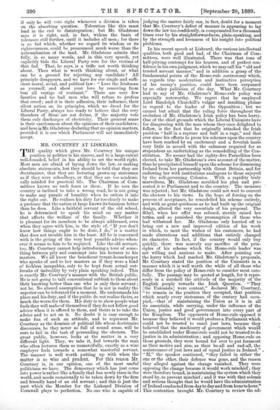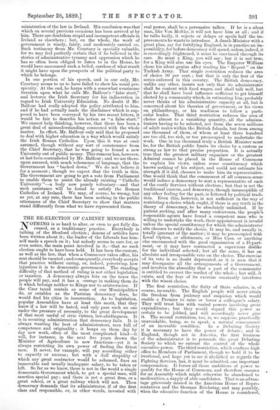MR. COURTNEY AT LISKEARD.
THE quality which gives Mr. Courtney his unique position in politics is his sincere, and to a large extent well-founded, belief in his ability to set the world right. Most men are afraid of laying down the law, or making absolute statements, lest they should be told that they are doctrinaires, that they are lecturing grown-up statesmen as if they were schoolboys, or that they are too academi- cally minded for practical life. The Chairman of Com- mittees knows no such fears as these. If he sees the country is inclined to take a wrong road, he is not going to make any parade of humility when he orders it into the right one. He realises his duty far too clearly to make a -pretence that the nation at large knows its business better than he does. Like a faithful servant of the old school, he is determined to speak his mind on any matter that affects the welfare of the family. Whether it is pleasant for its members to be always addressed, even when they agree with him, in the style of, " If you don't know how things ought to be done, I do," is a matter that does not trouble him in the least. All he is concerned with is the giving of the very best possible advice when- ever it seems to him to be required. Like the old servant, too, Mr. Courtney cannot help introducing a tone of some- thing between pity and contempt into his lectures to his masters. We all know the beneficent tyrant-housekeeper who speaks of and to her masters as if they were a kind of feckless incapables, only to be kept from actual out- breaks of imbecility by very plain speaking indeed. This is exactly Mr. Courtney's manner with the British public. He is not going to talk conventional rubbish to them about their knowing better than one who is only their servant ; not he. No absurd assumption that he is not in reality the superior can be tolerated for a moment. He understands his place and his duty, and if the public do not realise theirs, so much the worse for them. His duty is to show people what fools they will make of themselves if they do not follow good advice when it is offered to them, and theirs is to take the advice and to act on it. No doubt it is easy enough to make fun of such an attitude, and to represent Mr. Courtney as the dominie of political life whose doctrinaire discourses, be they never so full of sound sense, will be sure to fail in the task of persuading the electors. The great public, however, looks at the matter in a very different light. They, we take it, feel towards the man who often lectures them so unmercifully, exactly as a wise employer feels towards a somewhat masterful servant. The manner is well worth putting up with when the matter is so wise and prudent. For this reason Mr. Courtney is, in our opinion, one of the most useful politicians we have. The democracy which has just come into power is rather like a family that has newly risen in'the world, and needs occasionally to be taken down by the firm and friendly hand of an old servant ; and this is just the part -Which the Member for the Liskeard Division of Cornwall plays to perfection. No one who is capable of judging the matter fairly can, in fact, doubt for a moment that Mr. Courtney's defect of manner in appearing to lay down the law too confidently, is compensated for a thousand times over by his straightforwardness, plain-speaking, and by the strength and keenness of his insight into political problems.
In his recent speech at Liskeard, the various intellectual qualities, both good and bad, of the Chairman of Com- mittees, were well illustrated. There was that tone of half-pitying contempt for his hearers, and of perfect con- fidence in his own.judgment, which we may call his " old and trusted servant manner," and in addition a grasp of the fundamental points of the Home-rule controversy which, as regards true moderation and instinctive perception of his enemy's position, could have been surpassed by no other politician of the day. What Mr. Courtney had to say of Mr. Gladstone's Home-rule policy was especially noteworthy. We regret that he employed Lord Randolph Churchill's vulgar and insulting phrase in regard to the leader of the Opposition ; but we cannot but admit that the ruling force throughout the evolution of Mr. Gladstone's Irish policy has been hurry. One of the chief grounds which the Liberal Unionists have for disagreeing with the man whom they once delighted to follow, is the fact that he originally attacked the Irish problem " half in a rapture and half in a rage," and that ever since his efforts to press his schemes upon the country have been marked by an excitement and a feverish haste very little in accord with the calmness required for so stupendous an undertaking as the remodelling of the Con- stitution. No sooner had the eighty-five Parnellites been elected, to take Mr. Gladstone's own account of the matter, than he precipitated himself upon the scheme for dismissing Ireland from her partnership with Great Britain, and for endowing her with institutions analogous to those enjoyed by the self-governing Colonies. With a rapidity truly marvellous, Mr. Gladstone moulded his plan and pre- sented it to Parliament and to the country. The measure was rejected; but Mr. Gladstone could not wait to convert the electors to his views. In the hope of forcing on the process of acceptance, he remodelled his scheme entirely, and with as great quickness as he had built up the original design, altered the very essentials of his proposal. The Sibyl, when her offer was refused, sternly raised her terns, and so punished the presumption of those who had withstood her. Mr. Gladstone only hurried off to bring out a new and improved edition of his work in which, to meet the wishes of his customers, he had made alterations and additions that entirely changed its character. In fact, if the country would only buy quickly, there was scarcely any sacrifice of the prin- ciples of his scheme which the Home-rule leader was not willing and anxious to make. After pointing out the hurry which had marked Mr. Gladstone's proposals, Mr. Courtney stated the position of the Unionists in a manner which it is well worth the while of all those who differ from the policy of Home-rule to consider most care- fully. The passage may be quoted at length, for it repre- sents in a nutshell the attitude of the majority of the English people towards the Irish Question. " They [the Unionists] were content," declared Mr. Courtney, " to remain in the position they occupied, that position which nearly every statesman of the century had occu- pied,—that of maintaining the Union as it is in all its essentials, while carrying, under the influence of the Union, justice and good government into every part of the Kingdom. The opponents of Home-rule opposed it because they believed it would produce a Parliament which could not be trusted to enact just laws, because they believed that the machinery of government which would be established under Home-rule could not be trusted to do justice in its administration ; and opposing Home-rule on those grounds, they were bound for ever to put foremost as their motive and aim, as their be-all and end-all, the maintenance of just laws and of equal justice in Ireland." " If," the speaker continued, " they failed in either the one or the other, their defence was gone, and the reason they alleged against the change vanished. They were opposing the change because it would work mischief ; they were therefore bound, in maintaining the system which they stood by, to prevent mischief ; and it was with that solemn and serious thought that he would have the administration of Ireland conducted from day to day and from hour to hour." This contention brought Mr. Courtney to review the ad- ministration of the law in Ireland. His conclusion was that which on several previous occasions has been arrived at by him. There are doubtless stupid and incompetent officials in Ireland as elsewhere ; but, on the whole, the work of government is wisely, fairly, and moderately carried on. Such testimony from Mr. Courtney is specially valuable, for we may feel perfectly certain that if he believed in the stories of administrative tyranny and oppression which he has so often been obliged to listen to in the House, he would have announced such a belief, careless of what result it might have upon the prospects of the political party to which he belongs. In one portion of his speech, and in one only, Mr. Courtney seems to us to have failed to show his usual per- spicuity. At the end, he harps with a somewhat wearisome iteration upon what he calls Mr. Balfour's " false start," and lectures the Irish Secretary for his indiscretion in regard to Irish University Education. No doubt if Mr. Balfour had really adopted the policy attributed to him, and if he had actually made the disclaimer which is sup- posed to have been conveyed by his two recent letters, it would be fair to describe his action as " a false start." We cannot help thinking, however, that there has been a great deal of misunderstanding connected with the whole matter. In effect, Mr. Balfour only said that he proposed to deal with higher education in a way which would satisfy the Irish Roman Catholics. Upon, this it was at once assumed, though without any sort of countenance from the Chief Secretary, that he was going to found a new University out of public money. This rumour has, however, at last been contradicted by Mr. Balfour ; and we are there- upon assured, with much vehemence of language, that the Government has " backed down." We do not believe it for a moment ; though we expect that the truth is this. The Government are going to get a vote from Parliament to enable them to assist the already existing " Catholic University "—a body now purely voluntary—and that such assistance will be found to satisfy the Roman Catholics of Ireland. We may, of course, be wrong, but as yet, at any rate, there has been nothing in the public utterances of the Chief Secretary to show that matters stand differently from what we have represented them.







































 Previous page
Previous page